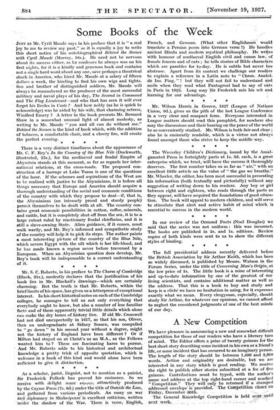There is a very distinct timeliness about the appearance of
Mr. C. F. Rey's In the Country of the Blue Nile (Duckworth, illustrated, 25s.), for the mediaeval and feudal Empire of Abyssinia- stands at this moment, so far as regards her inter- national relations, at the cross-roads. The proposed con- struction of a barrage at Lake Tsana is one of the questions of the hour. If the schemes and aspirations of the West are to be realized with justice to the Abyssinians, it is before all things necessary that Europe and America should acquire a thorough understanding of the social and economic conditions of the country with which they propose to deal—if, that is, the Abyssinians (an intensely proud and sturdy people) permit themselves to be dealt with at all. The country con- tains great economic possibilities in cotton, coffee, minerals, and cattle, but it is completely shut off from the sea, it is to a large extent ruled by reactionary feudal chieftains, and it is still a slave-owning State. Alien guidance, if it comes, must walk warily, and Mr. Rey's informed and sympathetic study of the country will help it to pick its steps. The author paints a most interesting pieture of the country of the Blue Nile, which covers Egypt with the silt which is her life-blood, and he has made known a region never before traversed by a European. When an Abyssinian question does develop, Mr. Rey's book will be indispensable to a correct understanding
of it. * * * *














































 Previous page
Previous page